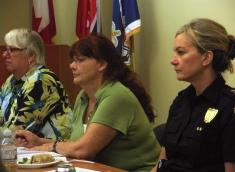Monday’s Ottawa Police Service (OPS) GLBT Liaison Committee meeting was dominated by the hot-button topic of a press release sent out last week identifying a man — by name and photo — charged with aggravated sexual assault after failing to disclose his HIV-positive status before having unprotected sex.
The much anticipated public meeting was attended by liaison members, individuals from the queer community and representatives from local queer organizations Bruce House, Jer’s Vision and the Youth Services Bureau (YSB). Also in attendance were those responsible for the press release, Inspector John McGetrick and Police Deputy Chief Gilles Larochelle.
The discussion over the press release began with Inspector Joan McKenna, co-chair of the GLBT liaison committee, admitting to attaching the phrase “sexual predator” to the release sent by the committee on May 10. McKenna expressed regret at her choice of words but emphasized the police force’s concerns.
“My concern was for community and the health of individuals. I’ve learned a lot from this. I’ve never been known to avoid conflict,” said McKenna. “My role is to continue my relationship with this community.”
The GLBT liaison committee forwarded the press release to its email subscribers on May 10, even though Marion Steele, the liaison’s community co-chair, was unhappy with the inflammatory language and the public health contacts used in the release. Steele was unable to contact anyone and had no clear authority to stop the release.
McKenna stated the release was a result of police consultation. However, Larochelle and McKenna agreed — with sensitive issues pertaining to the queer community — it was possible to discuss having press releases checked by community co-chairs before being sent to the GLBT liaison’s newsletter subscribers.
McGetrick, who was responsible for sending the press release to media on May 7, stated the OPS’ initial intent was to help people. He said the decision to include the photo on the press release was out of concern for pubic safety.
“I don’t know a single officer who can put his head down at night knowing they didn’t do the best they could,” said McGetrick.
The stance taken by the police was met with the counter argument that the press release was inflammatory and ignored public health concerns that such attention would discourage people from getting tested.
Jeremy Dias, executive director of Jer’s Vision, raised concerns about the consultation process behind the decision to include a photo on the release.
“I don’t understand how my police force can go against what so many of our community work for,” said Dias.
Dias also said the press release incited fear in a community that is already fearful of the police, and that it could drive people away from getting tested.
Jay Koornstra, executive director of Bruce House, was also concerned with the way the press release was handled. Koornstra said that the criminalization of HIV creates a false sense of security and that it discourages people from getting testing.
Andrea Poncia, program leader of HIV/AIDS prevention education at YSB, also agreed that the police tactics — with regards to the press release — were counter-productive.
“You are making it so people won’t get tested,” said Poncia.
Despite concerns raised by queer community representatives, the majority of individuals in the room sided with the OPS’ argument that public safety trumps personal privacy and public health concerns.
Many thanked the police for putting the photo on the press release and one community member, who requested not to be identified, admitted that seeing the accused’s photo in The Ottawa Sun alerted him to the possibility of his friends coming in contact with the accused. He referred to himself as a victim because his 22-year-old partner — who is HIV-positive — had slept with the accused.
He called the 72 people he knew to be gay on his Blackberry — including Dias — and he found six people who had sex with the accused. In his opinion the accused is “quite frankly trying to infect people.”
The evening ended in a stalemate — the police stood by their commitment to public safety, while others stood by public health concerns and fear that the hard work done to prevent rising HIV transmission rates will be compromised.
The OPS GLBT Liaison Committee meets each month at the Ottawa Police station, 474 Elgin St. They are currently looking for new members. For more information go to www.glbt.ottawapolice.ca/main.cfm.

 Why you can trust Xtra
Why you can trust Xtra


